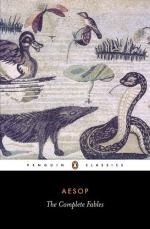It’s no use trying to hide what can’t be hidden.
THE SHEEP AND THE DOG
Once upon a time the Sheep complained to the shepherd about the difference in his treatment of themselves and his Dog. “Your conduct,” said they, “is very strange and, we think, very unfair. We provide you with wool and lambs and milk and you give us nothing but grass, and even that we have to find for ourselves: but you get nothing at all from the Dog, and yet you feed him with tit-bits from your own table.” Their remarks were overheard by the Dog, who spoke up at once and said, “Yes, and quite right, too: where would you be if it wasn’t for me? Thieves would steal you! Wolves would eat you! Indeed, if I didn’t keep constant watch over you, you would be too terrified even to graze!” The Sheep were obliged to acknowledge that he spoke the truth, and never again made a grievance of the regard in which he was held by his master.
THE SHEPHERD AND THE WOLF
A Shepherd found a Wolf’s Cub straying in the pastures, and took him home and reared him along with his dogs. When the Cub grew to his full size, if ever a wolf stole a sheep from the flock, he used to join the dogs in hunting him down. It sometimes happened that the dogs failed to come up with the thief, and, abandoning the pursuit, returned home. The Wolf would on such occasions continue the chase by himself, and when he overtook the culprit, would stop and share the feast with him, and then return to the Shepherd. But if some time passed without a sheep being carried off by the wolves, he would steal one himself and share his plunder with the dogs. The Shepherd’s suspicions were aroused, and one day he caught him in the act; and, fastening a rope round his neck, hung him on the nearest tree.
What’s bred in the bone is sure to come out in the flesh.
THE LION, JUPITER, AND THE ELEPHANT
The Lion, for all his size and strength, and his sharp teeth and claws, is a coward in one thing: he can’t bear the sound of a cock crowing, and runs away whenever he hears it. He complained bitterly to Jupiter for making him like that; but Jupiter said it wasn’t his fault: he had done the best he could for him, and, considering this was his only failing, he ought to be well content. The Lion, however, wouldn’t be comforted, and was so ashamed of his timidity that he wished he might die. In this state of mind, he met the Elephant and had a talk with him. He noticed that the great beast cocked up his ears all the time, as if he were listening for something, and he asked him why he did so. Just then a gnat came humming by, and the Elephant said, “Do you see that wretched little buzzing insect? I’m terribly afraid of its getting into my ear: if it once gets in, I’m dead and done for.” The Lion’s spirits rose at once when he heard this: “For,” he said to himself, “if the Elephant, huge as he is, is afraid of a gnat, I needn’t be so much ashamed of being afraid of a cock, who is ten thousand times bigger than a gnat.”




